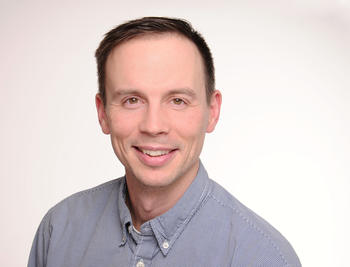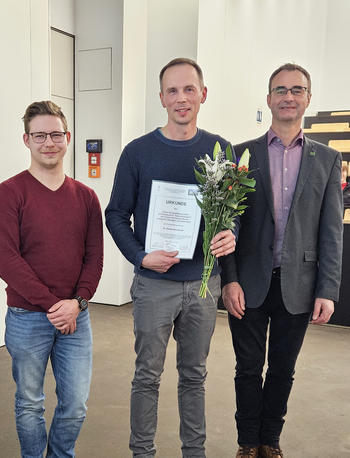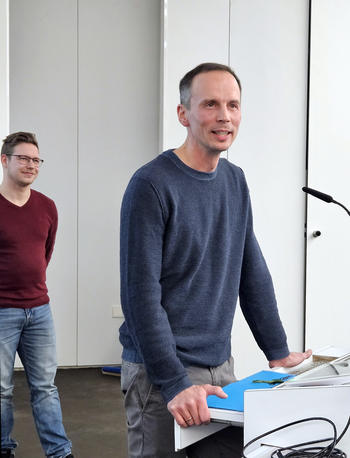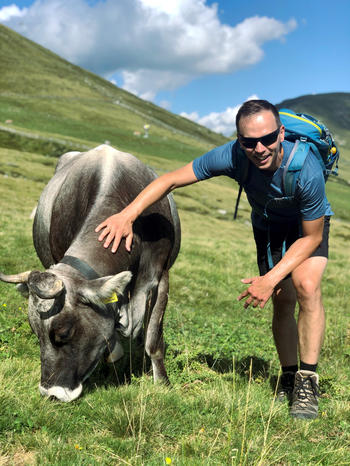Interview with teaching award winner Dr. Stefan Borchardt
Dr. Stefan Borchardt: research associate at the Farm Animal Clinic, Ruminants & Camelids Division, Pigs Division, Reproductive Medicine & Udder Health
From left to right: Leon Heinrich, chairman of the student council; Dr. Stefan Borchardt, 2025 teaching award winner; Prof. Jörg Aschenbach, vice-dean for teaching
Image Credit: Friederike Grasse, 2025
“We try not to explain the content in the most complex way possible, but first try to break it down and work out the important things so that they understand it in principle.”
Image Credit: Friederike Grasse, 2025
“In my free time, I like to do sports, be outside, go running, cycling and doing a lot with my two-year-old daughter.”
News from Mar 19, 2025
For which event did you receive the teaching award?
For the clinical demonstration (6th and 7th semester). In this case, it was about a fetotomy, which we themed for Halloween. We also dressed up for this special part of obstetrics and put on our best outfits, so to speak. It was very well received.
Which modules/subjects/events do you also teach (if any)?
I teach in clinical rotation, propaedeutics and teaching for all organ modules that exist in the field of reproduction: udder, birth, puerperium, neonatology, elective course.
How long have you been at the department?
Since 2014.
How long have you been teaching?
I've actually been teaching since day one.
What do you do when you're not teaching?
Our three main areas are teaching, research and services. My research is broadly concerned with reproduction in ruminants, especially in dairy cows. Last year I habilitated in the subject. As part of my research, I also worked on other aspects, including colostrum management in calves and the health of dairy cows in transition, i.e. everything related to the metabolism around calving. All of this can be understood as a service that is provided in the clinic. Since last year, I have been responsible for pigs on an interim basis within the Farm Animal Clinic.
In my free time, I enjoy sports, being outside, running, cycling, and spending time with my two-year-old daughter. We have a property with a relatively large garden and are currently trying to be self-sufficient; among other things, we have raised chickens. I also enjoy fishing.
What do you think you do particularly well in your classes – in other words, what is it that students particularly like?
We have a role model, especially here in reproductive medicine. It's the book by P.L. Senger entitled “Pathways to Pregnancy and Parturition”. There is an important thought in the preface:
“It's not only about making sure the information is correct, but it is also about making sure people can understand it. If they can understand it, it really doesn't matter if it is correct.”
I think that is a credo that we all try to implement. We try not to explain the content in the most complex way possible and not to hammer it into the students down to the last detail, but first try to break it down and work out the important things so that they understand it in principle. In addition, we in our working group have all benefited from Prof. Dr. Wolfgang Heuwieser, the predecessor of Prof. Drillich. For him, teaching was always particularly important and he also managed to implement this idea in a good way for us – in combination with research. We teach evidence-based, ideally underpinning the facts and contexts with our own studies.
What motivates you with regard to teaching?
I believe that our core task at the university is to educate students. I have the feeling that not everyone in the department perceives it that way. What motivates me is that students are usually very curious. You are always challenged to critically question yourself and the teaching concepts you have. I also draw motivation from the feeling of giving someone something that might help them in their professional life.
What aspects of teaching do you particularly enjoy and which ones do you enjoy less or not at all?
The propaedeutics, for example, has less enjoyable aspects. We have to get 160 students through this topic in a kind of module system. It can happen that you teach a particular sub-course six times in a row in one week. This repetition reminds me of the movie “Groundhog Day” and is not necessarily one of my favorite tasks. But basically, I really like the small group lessons, where you can also do something hands-on on the animal. I also really like the trips to the companies when I can show the students a real learning environment and point out things that may not be so present here.
What would you like to pass on to your students that goes beyond the course content?
I think it's important that we at the university are not too dogmatic when it comes to certain therapeutic principles. After all, in the end, students have to be self-critical in their professional lives, weigh things up and ideally make good decisions. I want to prepare them for that.
Beer mat slogans such as “frequent is frequent and rare is rare!” are also true. With the wealth of knowledge they acquire during their studies, it is important to focus on the essentials. The great thing about our profession is that we receive such broad training.
Why is your (lecture) topic your topic? What fascinates you about it and what interests you in particular?
The area of reproduction is very complex and interdisciplinary. From fertilization to birth, there is a lot to it. For dairy farms, it is essential to have animals with good fertility in order to be profitable. I have always found the interconnection between fertility and animal health to be fascinating.
I didn't really choose my teaching topics, I grew into them – including the topics I work on in research.
Do you still remember your first lecture/seminar? How did it feel to be “on the other side” for the first time? Did everything go according to plan?
It certainly didn't all go according to plan. To be honest, I don't remember my first lecture very well. But when I compare my lecture materials from today with those from my early days, I definitely see a development. Today, I try to integrate significantly more images and videos. This has of course developed very well with the obligation to teach online during Corona, because we were simply challenged to develop and try out new teaching concepts, e.g. the online transmission of operations and the creation of videos for certain activities.
Of course, honest feedback is important for further development and improvement. I regularly ask students what was good and what was bad and what we can do better. After every state examination in reproduction, that is, when the grades are determined, I ask these questions about my teaching. Points are often mentioned that we are happy to accept in order to improve.
Do you have fond memories of your own time as a student? What about?
Absolutely. It was the best time so far. I liked the fact that we had such good camaraderie. I made a lot of friends during my studies, and they still play a role in my life today. I was someone who was relatively often in lectures. Not necessarily because I liked the lectures so much, but because I just really liked campus life. I also liked being able to set my own priorities. Of course, the whole partying was also part of the degree program. And last but not least, Berlin itself naturally has many advantages.
What qualities did you value and like in your professors/teachers as a student? Do you sometimes think about that when you are teaching?
I do believe that I was particularly influenced by Prof. Heuwieser. I also experienced him as a lecturer. The entire team at the Institute of Reproductive Medicine was very popular with students during my studies because they had a good spirit and, in addition to teaching, also established some parties at the department, such as Docs on Decks.
In principle, I liked the teachers who were fascinated by their subjects and were able to convey and explain this fascination well.I do think back on that. But I also notice differences the further I move away from my studies. Younger colleagues or assistants often have a different perspective than I do. After all, you do develop into something of a “nerd” over time. Certain terms or contexts become so familiar in the course of your professional career that you unconsciously take them for granted and sometimes forget how complicated it is for students. You have to be careful not to get lost in these complex issues, but to keep things at the students' level.
I would like to see the department fundamentally raise the status of teaching and make educating students our top priority and most important task. In my opinion, everything else should be subordinated to this, or at least be well connected to it.
In addition, we should encourage students to fulfill their duty to express things they don't like – to bring them to the attention of the dean of teaching or trusted individuals, or to discuss them directly with the teacher.
The interview was conducted by Friederike Grasse.



